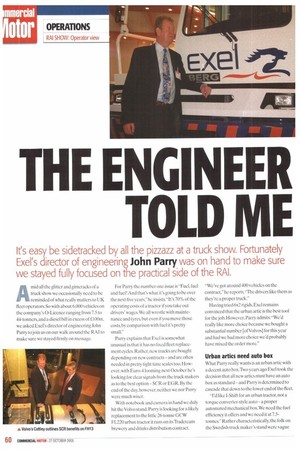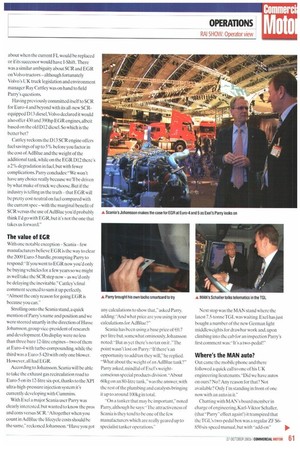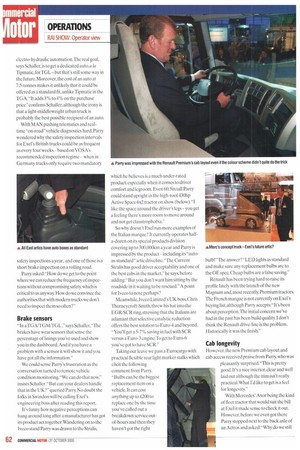THE ENGINEER TOLD ME
Page 62

Page 63

Page 64

If you've noticed an error in this article please click here to report it so we can fix it.
It's easy be sidetracked by all the pizzazz at a truck show. Fortunately Exel's director of engineering John Parry was on hand to make sure we stayed fully focused on the practical side of the RAI.
Amid all the glitter and gimcracks of a truck show we occasionally need to be reminded of what really matters to UK fleet operators. So with about 6,000 vehicles on the company's 0-Licence ranging from 7.5 to 44-tonners,and a diesel bill in excess of £100m, we asked Exel's director of engineering John Parry to join us on our walk around the RAI to make sure we stayed firmly on message. For Parry the number one issue is "Fuel, fuel and fuel! And that's what it's going to he over the next five years," he insists."It's 70% of the operating costs of a tractor if you take out drivers' wages. We all wrestle with maintenance and tyres, but even if you move those costs, by comparison with fuel it's pretty small."
Parry explains that Exel is somewhat unusual in that it has no fixed fleet replacement cycles. Rather, new trucks are bought depending on new contracts — and arc often needed in pretty tight time scales too. However, with Euro-4 looming next October he's looking for clear signals from the truck makers as to the best option— SCR or EGR. By the end of the day. however, neither we nor Parry were much wiser.
With notebook and camera in hand we duly hit the Volvo stand. Parry is looking for a likely replacement to the little 26-tonne GCW FL220 urban tractor it runs on itsTradeteam brewery and drinks distribution contract. "We've got around 400 vehicles on the contract," he reports."The drivers like them as they're a proper truck."
Having tried 6x2 rigids, Exel remains convinced that the urban artic is the best tool for the job. However. Parry admits: "We'd really like more choice because we bought a substantial number [of Volvos] for this year and had we had more choice we'd probably have mixed the order more."
Urban artics need auto box What Parry really wants is an urban artic with a decent auto box.Two years ago Exel took the decision that all new artics must have an auto box as standard — and Parry is determined to cascade that down to the lower end of the fleet.
"I'd like I-Shift for an urban tractor, not a torque converter-style auto— a proper automated mechanical box.We need the fuel efficiency it offers and we need it at 7.5tonnes.Rather characteristically, the folk on the Swedish truck maker's stand were vague about when the current FL would be replaced or if its successor would have I-Shift. There was a similar ambiguity about SCR and EGR on Volvo tractors-although fortunately Volvo's UK truck legislation and environment manager Ray Cattley was on hand to field Parry's questions.
Having previously committed itself to SCR for Euro-4 and beyond with its all-new SCRequipped Dl 3 diesel,Volvo declared it would also offer 430 and 390hp EGR engines albeit based on the old D12 diesel. So which is the better bet?
Cattley reckons the DI3 SCR engine offers fuel savings of up to 5% before you factor in the cost of AdBlue and the weight of the additional tank, while on the EGR D12 there's a 2% degradation in fuel, but with fewer complications. Parry concludes: "We won't have any choice really because we'll be driven by what make of truck we choose. But if the industry is telling us the truth that EGR will be pretty cost neutral on fuel compared with the current specwith the marginal benefit of SCR versus the use of AdBlue you'd probably think I'd go with EGR, but it's not the one that takes us forward."
The value of EGR With one notable exception Scania few manufacturers believe EGR is the way to clear the 2009 Euro-5 hurdle, prompting Parry to respond: "If you went to EGR now you'd only be buying vehicles for a few years so we might as well take the SCR step now as we'd only be delaying the inevitable." Cattley's final comment seemed to sum it up perfectly. "Almost the only reason for going EGR is because you can."
Strolling onto the Scania stand,a quick mention of Parry's name and position and we were steered smartly in the direction of Hasse Johansson, group vice-president of research and development. On display were no less than three bare 12-litre engines-two of them at Euro-4 with turbo-compounding, while the third was a Euro-5 420 with only one blower. However, all had EGR.
According to Johansson, Scania will be able to take the exhaust gas recirculation road to Euro-5 on its 12-litre six-pot, thanks to the XPI ultra-high-pressure injection system it's currently developing with Cummins.
With Exel a major Scania user Parry was clearly interested, but wanted to know the pros and cons versus SCR. "Altogether when you count in AdBlue the lifecycle costs should be the same," reckoned Johansson. "Have you got any calculations to show that," asked Parry, adding: "And what price are you using in your calculations for AdBlue?"
Scania has been using a base price of €0.7 per litre but. somewh at ominously,Johansson noted: "But as yet there's no tax on it ."The point wasn't lost on Parry:"If there's an opportunity to add tax they will," he replied. "What about the weight of an AdBlue tank?" Parry asked, mindful of Exel's weightconscious special products division."A bout 60kg on an 80-litre tank," was the answer, with the rest of the plumbing and catalysts bringing it up to around 100kg in total.
"On a tanker that may be important," noted Parry, although he says: "The attractiveness of Scania is they tend to be one of the few manufacturers which are really geared up to specialist tanker operations. Next stop was the MAN stand where the latest 7.5-tonne TGL was waiting. Exel has just bought a number of the new German light middleweights for drawbar work and, upon climbing into the cab for an inspection Parry's first comment was:" It's a two-pedal!"
Where's the MAN auto?
Out came the mobile phone and there followed a quick call to one of his UK engineering lieutenants. -Did we have autos on ours? No? Any reason for that? Not available? Only I'm standing in front of one now with an auto in it."
Chatting with MAN's board member in charge of engineering,K ad-Viktor Schaller, (that -Parryeffect again!) it transpired that the TGL's two-pedal box was a regular ZF S6850 six-speed manual, but with "add-on" electro-hydraulic automation.The real goal, says Schaller, is to get a dedicated auto.a la Tipmatic, for TGLbut that's still some way in the future. Moreover, the cost of an auto at 7.5-tonnes makes it unlikely that it could be offered as a standard fit, unlike Tipmatic in the TGA."It adds 3% to 4% on the purchase price" confirms Schaller, although the irony is that a light-middleweight urban truck is probably the best possible recipient of an auto.
With MAN pushing telematics and realtime "on-road" vehicle diagnostics hard, Parry wondered why the safety inspection intervals for Exel's British trucks could be as frequent as every four weeks based on VOSA's recommended inspection regime when in Germany trucks only require two mandatory safety inspections a year, and one of those is a short brake inspection on a rolling road.
Parry asked:"How do we get to the point where we can reduce the frequency of inspections without compromising safety, which is critical to us anyway. How do we convince the authorities that with modern trucks we don't need to inspect them so often?"
Brake sensors -In a TGATI'GM/TGL ,"says Schaller,"The brakes have wear sensors that sense the percentage of linings you've used and show you in the dashboard. And if you have a problem with a sensor it will show it and you have got all the information.
We could sense Parry's frustration as the conversation turned to remote vehicle condition monitoring."We can do that now," insists Schaller. "But can your dealers handle that in the UK'?" queried Parry. No doubt the folks in Swindon will be calling Exel's engineering boss after reading this report.
It's funny how negative perceptions can hang around long after a manufacturer has got its product act together. Wandering on to the I vcco stand Parry was drawn to the Stralis, which he believes is a much under-rated product, especially when it comes to driver comfort and legroom. Even hft 5in tall Parry could stand upright in the high-roof 430hp Active Space 6x2 tractor on show (below)."I like the space around the driver's legsyou get a feeling there's more room to move around and not get claustrophobia."
So why doesn't Exel run more examples of the Italian marque? It currently operates halfa-dozen on its special products division covering up to 300,0(X)km a year and Parry is impressed by the product including its "autoas-standard" artic driveline.-The Current Stralis has good driver acceptability and one of the best cabs in the market.he says, before adding: -But you don't want him sitting by the roadside in it waiting to be rescued." A point for Iveco to note perhaps?
Meanwhile, Iveco Limited's UK boss, Chris Thorneycroft-Smith, threw his hat into the EGR/SCR ring,stressing that the Italians are adamant that selective catalytic reduction offers the best solution to Euro-4 and beyond. "You'll get a 5-7% saving in fuel with SCR versus a Euro-3 engine. To get to Euro-6 you've got to have SCR."
Taking our leave we pass a Eurocargo with practical flexible rear light marker stalks which elicit the following comment from Parry. "Bulbs can be the biggest replacement item on a vehicle. It can cost anything up to £200 to replace one by the time you've called out a breakdown service outof-hours and then they haven't got the right bulb! "The answer'? "LED lights as standard and make sure any replacement bulbs are to the OE spec. Cheap bulbs are a false saving."
Renault has been trying hard to raise its profile lately with the launch of the new Magnum and,most recently, Premium tractors. The French marque is not currently on Exel's buying list, although Parry accepts:"It's been about perception.The initial concern we've had in the past has been build quality. I don't think the Renault drive-line is the problem. Historically it was the finish,"
Cab longevity However, the new Premium cab layout and cab access received praise from Parry, who was pleasantly surprised. -This is pretty good. It's a nice interior, clear and well laid out although the trim isn't really practical. What I'd like to get is a feel for longevity."
With Mercedes' Axor being the kind of fleet tractor that would suit the bill at Exel it made sense to check it out. However, before we even got there Parry stopped next to the back axle of an Actros and asked: "Why do we still










































































































































































































